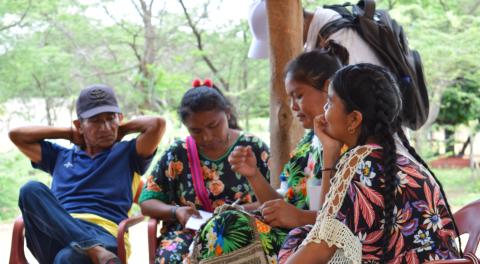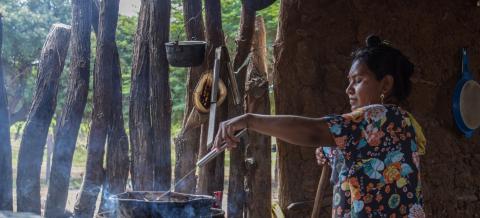
From the ground up: Empowering local oversight of extractive resources
Strengthening citizen engagement in natural resource governance
New research explores how local communities can be empowered to participate extractives sector oversight
The COVID-19 pandemic has thrown resource-rich countries into a triple crisis, and communities dependent on extractive revenues are particularly affected. Accountable extractives sector management is important as ever, as communities face downturns in the revenue, sector employment and social expenditures they previously relied on. But communities are too rarely consulted on the wider impacts these changes are likely to bring.
For communities to contribute to debate around natural resource management, they need access to relevant information. Countries that implement the EITI Standard disclose data related to the local impact of the sector, including the applicable fiscal regime, subnational payments and transfers, environmental payments and monitoring, and gender.
But for this data to be useful, communities need to be empowered to use it. New research, commissioned by the EITI with support from the Ford Foundation, explores opportunities for the EITI to enhance its support to empower local communities and civil society organisations (CSOs) to participate in extractive resource management.
The studies, carried out by independent consultants, focus on regions in Colombia (Buriticá), Ghana (Obuasi) and Indonesia (Samarinda and Palu) – each of these uniquely affected by extractive activities. They highlight the following areas where the EITI can improve its work.
1. Identifying barriers to participation
The studies identified a need to map local networks, key issues related to the impact of extractives, and political and socio-economic factors that hinder community participation in sector management.
According to the research, local CSOs and community-based organisations (CBOs) often struggle with access to funding and knowledge gaps, especially on technical matters. In Buriticá, CSOs face barriers such as average literacy levels, lack of basic resources and security issues, hampering their participation in initiatives like the EITI.
In order for the interests of local communities to be taken into account, the EITI process needs to engage diverse groups. The studies in Obuasi and Buriticá highlight the importance of including women, recognising the key role they play in communities, particularly on issues related to health, education and family. Yet when it comes to participating in the extractives sector, women face significant barriers. In addition, more outreach activities are needed to engage indigenous groups, rural leaders and youth, whose voices are critical in local debates on the sector.
2. Promoting innovative dissemination of data
Communicating and disseminating EITI data to local communities in an accessible manner remains a significant challenge. The lack of systematic engagements, accessible content and channels, funding and capacity help explain gaps in engagement from local actors on extractives-related issues. Communication and engagement activities in Ghana and Indonesia are too often carried out ad hoc, with EITI Reports shared without established feedback mechanisms for local stakeholders to discuss findings most relevant to them.
The research showed that data reported through the EITI partly addresses local demands. But more work is needed to explore how this data can complement other sources of information from government, industry, civil society, media and academia, which do not typically participate in EITI implementation.
In Obuasi, communities are particularly interested in knowing which government agencies oversee the royalty system, how to hold these agencies accountable and how to communicate grievances. They are also concerned with whether revenues were invested in access to water, transportation routes and connectivity. Stakeholders in Samarinda and Palu stressed the importance of data in exposing and preventing corrupt practices, as well as in holding government and companies accountable for environmental damage and human rights violations.
3. Strengthening engagement and trust
There are opportunities for EITI multi-stakeholder groups (MSGs) to strengthen their engagement with local actors and capitalise on the vibrant networks that have an interest in the impact of extractive activities.
For example, the Community Assembly of Buriticá offers programmes that support communities affected by extractives. In Obuasi, AngloGold Ashanti holds regular townhall meetings, and there is a diverse network of youth groups, women’s associations and community information centres. If engaged with regularly, these forums can be a meaningful space for EITI data to be debated.
In Indonesia, the relationships between communities, local government officials and extractive companies are often marred by distrust, with some communities starkly opposed to extractive activities. Multi-stakeholder forums established at the national level are not necessarily mirrored locally, where the social and environmental impacts of extractive activities are often more pronounced.
Community outreach and communication on the impact of the extractive sector could help promote dialogue and build trust. In contexts where restrictions to civic space are growing or exacerbated by the COVID-19 pandemic, the EITI can help uphold the provisions of the Civil Society Protocol at the local level.
Enhancing support on community engagement
Building on lessons learned from Colombia, Ghana and Indonesia, the studies provide recommendations on community engagement that are relevant to the wider EITI community. The International Secretariat will work with stakeholders where there is in-country demand to put these recommendations in practice. There is high demand for updated guidance and peer-learning on EITI Requirements that address the local impact of extractives, including subnational payments and transfers, environmental monitoring, the contribution of the sector to local development and the impact of the COVID-19 crisis. Mobilising support on strategic communications will also help demonstrate the link between EITI implementation and issues of interest to citizens, such as anti-corruption, domestic resource mobilisation, energy transition and sustainable development.
For extractive data to have an impact, it needs to be analysed and debated by the citizens to whom a country’s natural resources belong. Disclosing data in an open and accessible format is a good starting point. But for the EITI to achieve meaningful debate, it should help empower local communities to engage with the data and influence decision-making.



